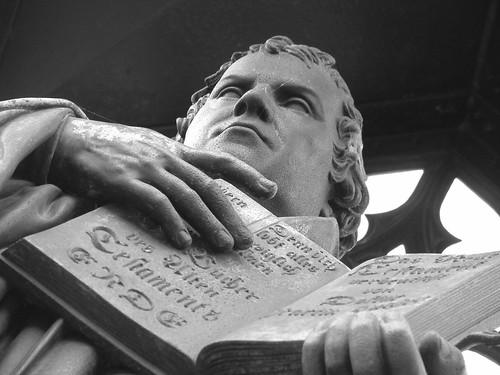
A reader recently emailed with this question:
I have been dialogging with some reformed brothers regarding the authority of the church. If you have time and the desire to do so, you can check out the discussion on their blog: (http://bywhoseauthority.blogspot.com). They seem to keep trying to make the point that any argument that can be made against sola scriptura can also be made against the infallible authority of the church…I am having a hard time understanding how some very intelligent people can tackle some pretty deep theological issues yet accept sola scriptura a priori. One of the authors admitted that the church is necessary to interpret scripture but then said,”The fallible Church is subject to the infallible authority given through Scripture.”
Thank you for the email.
The Reformed doctrine of infalliblity goes like this:
God (infallible) > Sacred Scripture (infallible) > Church (fallible) > Individual Believer (fallible)
Reformed people wrongly assume that Catholics just want to add another level of infallibility – sort of like adding another ten inches of insulation in your attic for good measure. Reformed folks believe that infallibility for the Catholic looks like this:
God (infallible) > Sacred Scripture (infallible) > Church (infallible) > Individual Believer (fallible)
However, Catholics have a completely different understanding of infallible authority. It does like this:
The Father (infallible) sent His only Son (infallible) to earth. Christ instituted prophets and Apostles (fallible) to proclaim the Gospel (infallible). A special charism of the Holy Spirit was given to these fallible men for composing the Sacred Scriptures (infallible) and teaching the Sacred Traditions (infallible).
Through the Sacrament of Holy Orders, the episcopate in union with the successor of Peter, infallibly interprets the infallible Scriptures and Tradition enjoys the charism of infallible interpretation. It’s a spiritual gift that Christ gave to the Church.
This is different from the Reformed order because the “state of infallibility” does not have a historical terminus. Through the Holy Spirit infallible authority endures until the end of the time – so that the gates of Hell should not prevail against the Church. As a result, “the Church is the pillar and bulwark of truth” (1 Tim 3:15).
This view is consonant with Scripture. Scripture never presents “Scripture alone”. However, it does demonstrate that there is authoritative oral tradition (2 Thess 2:15, etc.) and that there are men with infallible interpretation and authority (Matt 16:18; 18:18-18). Hence, we find a three-legged stool of Scripture/Tradition/Magisterium.
Infallible authority isn’t static or resting under layers of history. It is present today and therefore accessible.
Hat tip to David.


Comments Policy: I reserve the right to delete comments that are offensive or off-topic. If your comment contains a hyperlink to another site, your comment automatically goes into "Comments Purgatory" where it waits for release by way of moderation.